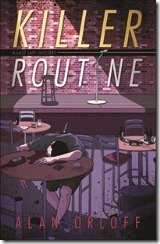Riley Adams's Blog, page 207
April 19, 2011
Keeping the Fun in Writing
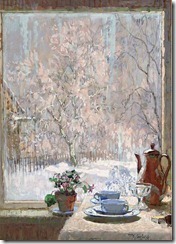 My teenager has a love/hate relationship with music right now.
My teenager has a love/hate relationship with music right now.
I can understand where he's coming from. He really enjoys music and loves making it. He's not so wild about the hours of practice.
He plays the baritone for school and recently told me that he was interested in starting guitar lessons.
My husband pointed out that he would probably enjoy guitar more and practice more if he enjoyed the lessons and if the teacher made it fun. I asked around and finally settled on a teacher that several of my son's friends were using.
Last week was the first lesson. I knew the teacher was going to work out when the first thing he asked my son was, "What type of music do you like to listen to?"
Sometimes I can feel the same way about writing that my son feels about music. There's a lot of work involved in practicing the writing craft. I love writing. But sometimes when the editing or promo is dragging me down, I have to remind myself that I do.
There are definitely some easy ways to make writing more fun. I think the most important one is to write what you enjoy reading.
Also:
Write what you're good at (dialogue, action, humor). Nothing beats feeling successful about what you're writing and know that you're doing a good job.
Write in different places—outside, inside, coffee shops, etc. . The nice thing about writing is its portability.
Read for inspiration and as a reminder of why we choose to write.
For some reason, office supply stores (which are dangerous places for me!) are always fun. I love coming back with sticky notes, pencils, pens, and new notebooks of different sizes.
Hang out with other writers—online and in person. It's inspirational.
How do you keep writing fun?
**********
Interested in a monthly newsletter with the top writing articles, blogger spotlights, and interviews with industry insiders? Sign up for the free WKB newsletter here: http://hiveword.com/wkb/newsletter . (You can unsubscribe at any time, and your email information is never shared.)
April 18, 2011
Actions Speak Louder Than Words
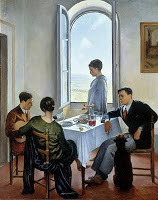 One of the downsides of being a writer, I think, is the fact that we can become hyper-critical as readers and filmgoers. It's so much harder for me to get totally absorbed in a story.
One of the downsides of being a writer, I think, is the fact that we can become hyper-critical as readers and filmgoers. It's so much harder for me to get totally absorbed in a story. One of the things that really pulls me out of a book or movie is when a character acts out of character.
In one book I read recently, the author had gone to great pains to tell how intelligent one character was. The character had experienced great academic success, had a great job, read thought-provoking literature.
All of that gets chucked out the window for me when that same, "smart" character does something really foolish in the book.
It was obvious that the writer had needed the character to do something stupid, just to make the plot move in a particular direction.
To me, this just demonstrates how much more powerful showing is than telling. Sure, you can tell me that this character was summa cum laude, but if the character is blithely heading into a dark cellar when she has a sneaking suspicion that a killer is down there, then you've shown me she isn't so bright.
It's a good reminder for me, because I'm frequently thinking about ways to convey personality traits, etc., by showing, but I don't often think about the process the other way around.
What I think I'm going to start looking at when I'm doing edits is, "Have I left the reader an impression about this character that I didn't intend?" Especially if it contradicts an image that I'm trying to plant.
Because actions can speak louder than words.
Have you run across characters in films or in books that you felt were acting out of character? And, as a side note, is it harder for you, as a writer, to get totally wrapped up in a book or movie without being critical?
April 17, 2011
Quick Note on Blogs and Branding
 I follow a bunch of writing blogs--nearly 2000 now. And each time I find another writing blog out there (I'll click a new follower's link on Twitter, I'll click a link in someone's blogroll, etc.), I immediately click over and subscribe.
I follow a bunch of writing blogs--nearly 2000 now. And each time I find another writing blog out there (I'll click a new follower's link on Twitter, I'll click a link in someone's blogroll, etc.), I immediately click over and subscribe.
It's funny, but 90% of the time, I can tell the writer's genre from their blog. YA blogs pop on the page, mystery blogs have a lot of dark backgrounds (obviously Mystery Writing is Murder doesn't conform! I have a hard time reading dark backgrounds, so I just made mine very minimalistic. But I did get the word "mystery" in the masthead…), romantic blogs have a softer look, etc.
To me, it's instant branding. I get it. In my head I'm thinking, "Okay, when I'm looking for some great material from a YA/SFF/mystery/romance blog, then I'll pop by here."
There must be many other people who do the same thing—click over to a blog and get a feel for the writer who posts there and the material they write. I'm sure some of these folks are agents and editors who follow links in queries to blogs.
So I think it can be useful to either mention your genre in the subtitle of your blog (conventional wisdom states that it's the best branding practice to have your name as the blog's name—oops. :) ) or have the genre be obvious to anyone spending a few seconds on your site.
Helpful elements to have on your blog:
RSS feed button for those of us who like to quickly subscribe
Contact me link (you'll want agents or editors or other people to be able to reach you)
A way to belong: While I'm subscribing, I usually want to click on a Networked Blogs follow button or some other type of followers button
Blogroll: These are great for link exchanges. (Are you on mine? If you're not, let me know and I'll add you to my blogroll.)
About me: Even if you're anonymous you can spare a few tidbits. Something like "Science Fiction reader and writer who also enjoys writing poetry." Just something.
Buy links: If you've got books out
Links to any social media you belong to. For my purposes, it's handy to see a Twitter link if you have one so that I can @ you if I tweet a post.
Have any other tips for useful things to have on blogs? How does your blog introduce you to readers, writers, and others in the industry?
April 16, 2011
Twitterific

![Terry3_thumb[1]](https://i.gr-assets.com/images/S/compressed.photo.goodreads.com/hostedimages/1380447585i/1701687.png)
Here are writing links that I've posted to Twitter in the last week.
I'm delighted that now we have an efficient method of locating resources on writing topics when you need them—via the Writer's Knowledge Base search engine and software engineer and writer Mike Fleming's ingenuity. The links I tweet (which are writers' blogs, agents' and editors' blogs) all are added to the engine to make it easier for you to access the information you're looking for.
Interested in a monthly newsletter with the top writing articles, blogger spotlights, and interviews with industry insiders? Sign up for the free WKB newsletter here: http://hiveword.com/wkb/newsletter . (You can unsubscribe at any time, and your email information is never shared.)
Jewels in crime fiction: http://bit.ly/e8c7fD @mkinberg
Foursquare Tool for Crime Novelists: http://bit.ly/ii9rFb @galleycat
How to write a screenplay: http://bit.ly/gKgymp
You Need a Complete Manuscript: http://bit.ly/gr1iKQ
What Not to Worry About in a 1st Draft: http://bit.ly/idYvQw
Rejecting the genre, not the writing: http://bit.ly/eSsQnX
When agents fly the coop: http://bit.ly/gNXQb0
Is it YA or Not? 5 Ways to Tell: http://bit.ly/hPDQLW
Can Reading Great Books Really Help Writers Grow? http://bit.ly/fnNDb5
Tips for perfecting your prose: http://bit.ly/gn78cx
A manifesto for creatives: http://bit.ly/gXyjug
Writing Is Like Comfort Food: http://bit.ly/eJNQmp
5 Ways to Repair Misused Em Dashes: http://bit.ly/dQFEZZ
On opening lines: http://bit.ly/g13E5F
Smart, Non-intrusive Ways to Monetize a Blog: http://bit.ly/eV1Cel
Myst. Lov. Kitchen: Hurry Scurry Berry Tart http://bit.ly/i2owGN
2 writers with thoughts on writing humor: http://bit.ly/g3GCdA
Offbeat Lessons From 3 Late-Blooming Writers: http://bit.ly/fwy4fl
Where does dystopia fit as a genre? http://bit.ly/h1UXd9
4 places to check your transitions: http://bit.ly/hmVwjq
Self-Publishers Speak: Weaving Your Safety Net Mid-leap: http://bit.ly/g9dwi5
Get Prepared for Maximum Writing Effectiveness: http://bit.ly/e66eZy @NewbieAuthor
What a good old-fashioned lie can do for your story: http://bit.ly/gOseDo
Crafting an Opening That Draws You In: http://bit.ly/ianoIe
Finding Your Voice: 7 Tips: http://bit.ly/hTfR1S @CherylRWrites
The Top Seven Reasons Publishers Reject Nonfiction Book Proposals: http://bit.ly/enxWDd
Now with over 7000 links to help #writers find resources: http://bit.ly/dYRayA
Creativity Tweets of the Week — 4/15/11: http://bit.ly/ftkuKq @on_creativity
The Query Quandary: http://bit.ly/fl61Ze @WriteAngleBlog
Outline Techniques for Those Who Hate Outlines: http://bit.ly/fLvjcy
The Princess Bride—Storytelling Done Right: http://bit.ly/eCCBw7
Best Articles This Week for Writers 4/15/11: http://bit.ly/ezjYbU @4kidlit
Tweets, texts & posts: New sources for memoir writers: http://bit.ly/eJxUaX
A look at literary assistants (part 2): http://bit.ly/hzh68q
10 Sentences with Muddled Meanings Made Clear: http://bit.ly/h2P9Q2
5 Innovative Poets to Watch & Learn From: http://bit.ly/i8xcoj
Tips for writing transitions: http://bit.ly/eXsCLT
To Kindle, With Caution: http://bit.ly/eFAW0g
When Your WIP Is Too Short aka Massive Panic Attack Time! http://bit.ly/h7wXhB
Ebook Spam - "Bound" to Happen: http://bit.ly/dNG9ku @hopeclark
What to do if you love a book: http://bit.ly/ikwOpz @MaryJaneMaffini
Author income streams: http://bit.ly/f2zWOZ
Character Development in the 4 Act Structure (for erotic romance writers & others): http://bit.ly/eUtO9U @SaschaIllyvich
99 cents only works if you actually sell more copies: http://bit.ly/dZT9Ps
The Periodic Table of Storytelling and Cultural Gender Bias: http://bit.ly/hmTvWB
Myst. Lov. Kitchen: Cookies from Leftovers! http://bit.ly/ewbkkI
Self-Publishing 911: http://bit.ly/idkNs5
Dystopian Fiction: An Introduction: http://bit.ly/hpFSFz
What does a writer need to succeed? Discipline: http://bit.ly/g5Bmua
What is your social media influence score? (And does it matter?): http://bit.ly/eyPOdX
Changing the Writer's POV: http://bit.ly/htG0E2
Widows and Orphans: http://bit.ly/emnyo0
Theories of literary greatness that enrage and perplex: http://bit.ly/g6c7Nw
7 writing sins and tips for avoiding them: http://bit.ly/i8Dgt9 @Riduna
Apple's Incredible iPad, One Year In: http://bit.ly/eR1jYZ
10 writing issues that stop agents in their tracks: http://bit.ly/fzp6ix
8 secrets writers won't tell you: http://bit.ly/fXvO58
Don't Ignore Logic When Writing Fiction for Children: http://bit.ly/i3ycp4
Think Like a Publisher #7… A Sales Plan: http://bit.ly/eC9N7D
Surviving the publishing apocalypse: http://bit.ly/hD2T2F @ajackwriting
Tools for writers who are learning addicts: http://bit.ly/hgKeYo @jamigold
Writers Conference or Workshop? http://bit.ly/h2fMu5
Updating a novel--yes or no to including current music and tech trends? http://bit.ly/grCTuC @authorterryo
The Short Synopsis: http://bit.ly/f5hfdP
Steinbeck's travel book gets fact-checked (NY Times): http://nyti.ms/gLYZey
Confessions of an A.D.D. Writer: http://bit.ly/f7C1lX @jhansenwrites
Want to write? 18 great writers and thinkers show you how: http://bit.ly/gRqk4O @inkyelbows
Top 5 Ways to Get Your Articles Found and Read Online:http://bit.ly/f6t0kj
Explaining steampunk: http://bit.ly/g0mnHh
How a Simple Timer Can Magically Improve Your Productivity: http://bit.ly/hcRYyU
Keeping book clutter off the bookshelf: http://bit.ly/hQYXOv
Myst. Lov. Kitchen: How to Make Fondue http://bit.ly/i5XaNY
Support Your Fellow Writer: http://bit.ly/h0P8g0
The Secret History of Ads in Books (NY Times): http://nyti.ms/fQ6H5I
A writer worries about giving his Social Security number to editors: http://bit.ly/ekD8OZ
Writers' torture: waiting for your script to be read: http://bit.ly/eZSaLp
Your Backlist Is a Veritable Gold Mine: http://bit.ly/grg8VA
Costly pitfalls to avoid when setting up your website: http://bit.ly/fqhRUv
7 Rules to Pitching a Glossy Magazine: http://bit.ly/eDQQo5
Is your book's setting ho-hum? http://bit.ly/gByyLa
A Dollhouse Metaphor for Writing: http://bit.ly/gBCoLZ
Accept your foibles and observe your writing patterns: http://bit.ly/fVLVpG
5 tips to quickly finish your 1st draft: http://bit.ly/hLSAci @alanorloff
Selling Poetry? 5 Ways to Market Your Book of Poems: http://bit.ly/iedK8a
Query letters for scriptwriters: http://bit.ly/huZPna
Launch a Brand New Blog … with Authority: http://bit.ly/f66x7q
Interactive Narratives and the Future of Storytelling: http://bit.ly/i2BlA4
How to use props in your writing: http://bit.ly/id0q89 @cristinterrill
Track Changes…Friend To Writers and Trees: http://bit.ly/i425fD @jhansenwrites
First Person Verses Third Person: http://bit.ly/eUvlyG
The Top 10 books Americans most want banned (Guardian): http://bit.ly/hfFACw
On Editor/Agent Requests - Some things to consider: http://bit.ly/fCimWP
Dialogue--make it matter: http://bit.ly/hpZDDR @juliemusil
Win vs. compete: http://bit.ly/fLmiaI
This Week's Fail Whale–The Twitter Tyrant: http://bit.ly/ghEmoA
Myst. Lov. Kitchen: Fruit Salad in a Flash http://bit.ly/hbUkmA
The E-Publishing Outlook for Average Authors:My E-Book Sales: http://bit.ly/fY4jFe
And now there's a book out there with your name on it. Imagine that. (Guardian): http://bit.ly/h7duGW
Short Stories vs. Novels - "natural length" and the fractal structure of stories: http://bit.ly/e7URUH
Writerly confessions: http://bit.ly/hRg08m @SW_Messenger
The Kindle as a revision tool: http://bit.ly/fROdtR
Confessions of a Dangerous Twitterer: http://bit.ly/dGMDHN
The Fine Art of Conquering Impatience: http://bit.ly/h6GaMe
Tips for Kindle Authors: http://bit.ly/gl82CU @thecreativepenn
Dialogue Problems and How To Fix Them 1: All your dialogue sounds the same. http://bit.ly/hY0MmK @ajackwriting
ABCs of story analysis: http://bit.ly/em1iYf
One writer has a publisher but still wants an agent. Here's why: http://bit.ly/eM5jNt
Proper Use of The Semicolon: http://bit.ly/gRQoOg
When friends and family don't get the point of our writing: http://bit.ly/eknr8D
The importance of setting: http://bit.ly/hG8UW5
More on Success and Rejection: http://bit.ly/dUw9p3
The difference between editing and proofreading--and tips for both: http://bit.ly/hhaPwW @jhansenwrites
3 steps to finding alternate endings that work: http://bit.ly/fwkfc0
Want to Sell Your Story? Peel Away the Layers to Create Memorable Characters: http://bit.ly/fpTIPP @authorterryo
The Best Agent Blogs of 2011: http://bit.ly/fimD0k
Need tips for plotting? http://bit.ly/fiTDIR
5 things stand-up comedians can teach you about self-publishing: http://bit.ly/dIpwU5
Protagonists shouldn't be bystanders in their own lives: http://bit.ly/gINJaN
The Protagonist: Using Character Clusters: http://bit.ly/gJT8Y0
The ingredients of a perfect writer's blog: http://bit.ly/gVAecj
Top 5 Mistakes Writers Make at Conferences: http://bit.ly/g13Kqf
Less is more when writing: http://bit.ly/g5YwZq @Paize_Fiddler
The Dreaded Query Letter: http://bit.ly/dWhzs3
Myst. Lov. Kitchen: Maple Cookies 2 Ways from Cleo Coyle http://bit.ly/ikuoXR
All about line editing: http://bit.ly/ePcMun @victoriamixon
Telling Just Enough: http://bit.ly/ftjjNu
How to keep having great ideas: http://bit.ly/hePATC @jammer0501
Some examples illustrating authorial voice: http://bit.ly/gRE8kr
Give yourself permission to be as creative as you can be: http://bit.ly/dEVRzD
Research--how to do it and when to stop doing it: http://bit.ly/gRdygL
Trends in Middle-Grade: http://bit.ly/hffjcZ @jemifraser
One writer is a Kindle convert (National Post): http://bit.ly/euWORb
What if literary characters were agents? http://bit.ly/hZ93xm
Pre-pub book marketing tips: http://bit.ly/g5SlPR
Writing your Synopses: How to begin? http://bit.ly/eCWmYq
Write For A Living In 7 Easy Steps: http://bit.ly/fBsrkx @thecreativepenn
You Can't Hook a Reader with a Yawn: http://bit.ly/gY6FdV
The Positive Side of Rejection: http://bit.ly/evIzRg
The phrase every publisher craves: word-of-mouth success (Guardian): http://bit.ly/eaCupc
Dialogue Tags: How To Kill Off Some Of The Little Buggers: http://bit.ly/g71qor
The Pain and Pleasure of Back-to-Back Releases: http://bit.ly/fUhHqT @MasonCanyon
3 Traits Your Hero and Villain Should Share: http://bit.ly/i23dKx
Using Comments to Build Your Blog Readership: http://bit.ly/ggWqUS
Helpful Wordpress plug-ins: http://bit.ly/fgwgpz
Excel: A Writer's Best Friend: http://bit.ly/fN99jY
4 social media lessons from the world of book publishing: http://bit.ly/ef5uWi
Ebook Authors: The Kids Are Coming: http://bit.ly/hXC8YV
The Trouble With Triples: Writing Trilogies: http://bit.ly/dUtKyj
I Didn't See That Coming: How To Avoid The Kiss-Of-Death Of Being Predictable: http://bit.ly/h14bJc
A crossword puzzle for romance readers (Borders blog): http://tinyurl.com/4xeoma8 @joanswan
Creating characters with disabilities: http://bit.ly/e7pp5g
Myst. Lov. Kitchen: Un-Blueberry Pie http://bit.ly/ew9FZF
The less you spread yourself thin, the better your work: http://bit.ly/i4vfVF @hopeclark
Query Letters: Part 2: http://bit.ly/fAONgb
Two Sides to a Story: Plotting For Everyone: http://bit.ly/hawQlE
3 Tips For Finding Something To Say When You're Out of Ideas: http://bit.ly/fOearm
Scoring a Well-Rounded Manuscript: Voice: http://bit.ly/gwti1y
You gotta have an agreement first, doggone it: http://bit.ly/fa0XGq
No, Really. Finish the Manuscript. http://bit.ly/hA5QO0
Conversion Journey: One Writer's Word-to-E-book Workflow: http://bit.ly/hK02m1
Pacing Potholes: Common Hazards that Slow Forward Motion: http://bit.ly/gw2XG2
Query Letters That DON'T Work, Not Even a Little Bit: http://bit.ly/hsSD5t
Top 5 Children's Lit Agencies: http://bit.ly/fVyMiw
Why being agented is weird: reason #1: http://bit.ly/iiSVEX
Defining a content edit: http://bit.ly/fF04UI
10 Creativity Lessons from George Carlin: http://bit.ly/fFyHWc
Manuscript makeovers: http://bit.ly/dYqrHF
Pitching *is* a job interview: http://bit.ly/gatx3w
A mobile scriptwriting app: http://bit.ly/edzKDI
Write A Synopsis, Disney-Style: http://bit.ly/es0OaD
Myst. Lov. Kitchen: Killer Kugel - to die for! http://bit.ly/dKcMeA
Should Self-Pubbed Authors Refer to Themselves as "Indie?" http://bit.ly/dPStAp
Switching your character's goal: http://bit.ly/dUj1iM
How Much More Do You Have to Learn? http://bit.ly/fUlwp0
Beautifully Written: http://bit.ly/gzG1Ge
On dramatic POV: http://bit.ly/fU2U1z
Story architecture--lessons from "The Source Code": http://bit.ly/eiOy0k
Screenwriting glossary: http://bit.ly/f8YOBC
8 tips for making your editor love you: http://bit.ly/i2IaNX
5 Reasons Your YA Character Might Flop: http://bit.ly/gpAKt5
Lemony Snicket's (Very Random) Guide for Writers: http://bit.ly/hwvyYP
Evaluating Critique Feedback: http://bit.ly/en7Utm
Once upon a backstory: http://bit.ly/gI87dR
5 things one writer wishes she'd known about the writing business: http://bit.ly/eCEluA
Eliminating Distancing Verbs: http://bit.ly/hpZZjk
Organizing a Writers Workshop: Pre-Publicity: http://bit.ly/fuBMap
Amping up your writing by getting fresh: http://bit.ly/eZfwUC
Dangling modifiers: http://bit.ly/eYAFtz
April 15, 2011
Where to Get Started
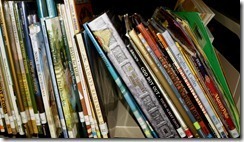 Twice in the last month, I've had someone say to me, "I've always wanted to write a book. But I just don't know where to start."
Twice in the last month, I've had someone say to me, "I've always wanted to write a book. But I just don't know where to start."
I think writing a book can seem really overwhelming. There are tons of resources out there, but those resources can be helpful…and overwhelming at the same time.
Most of the people who say they want to write a book have a germ of an idea already. It's this idea that's been on their mind for however long they've wanted to write.
Maybe it's a family story. Maybe it's just a thought they've had that they're not sure how to develop. But there's something there.
What these folks need to do is not worry about all the info on queries, synopses, and craft. It's always nice to just focus on the story.
First of all is identifying that story. What was the seed of the idea that came to the writer? Who is the main character? What's the main conflict? What does this character most want and how is that thing denied her/him?
Then it's telling the story. What happens next? What obstacles does this character run into when trying to get what they want most? Are these obstacles other characters? Events? The character himself? How does this character overcome these obstacles?
Where should you start with a first draft? Start at the beginning. Or…start at the end. I've done both. I've started at the beginning, skipped ahead to the middle of the book, then written the end. I've written books straight through and I've written books that I've run into huge problems with—and skipped around to whatever scene I've got in my head instead of moving forward in a linear way.
You don't have to block hours off on your calendar for this project. Try blocking off 30 minutes. Or even 15. Don't try to play catch-up the next day if you miss your goal the day before—treat each day as a clean slate and just get your 15 minutes of writing in.
It doesn't matter if your first draft is bad.
You can either outline your story or make it up as you go along. I've done both.
Ask yourself, "And then what happens?" a lot.
Make friends with writers online—they will understand what you're going through and can give you support and encouragement.
If you encounter set-backs with your story, brainstorm ways of getting past the problem—make lists of ways to get your characters out of the mess they're in.
Got any other advice for where to start writing a book? What have you learned from writing yours?
April 14, 2011
Making a Transition
 I'm sure that my 14 year old son would like to correct anyone who thinks it's cool to have a writer for a mom. :)
I'm sure that my 14 year old son would like to correct anyone who thinks it's cool to have a writer for a mom. :)
I was reading through his research paper before he turned in yesterday. I thought he did an overall great job on it, but there was one thing that grated on me. I tried to mention all the good things first.
"Great job putting the info in your own words!" I said. "You've got some really solid paragraphs, too—nice topic sentences and supporting details. And those footnotes! Wow!" I hesitated.
"Okay. So what's wrong with it?" he asked. He's a cutting-to the-chase kind of kid.
"It's choppy. There really aren't any transitions between your thoughts. You're presenting the info, but it's not connected. It's just sort of jarring."
Maybe it's not the biggest problem for a research paper, but poor transitioning sure does make for a bumpy read in a novel. It's not fun to be confused or to wonder what's going on when I'm reading a book. Or to be bored by a transition that's too long or not necessary.
Transitions (or lack of them) that pull me out of a story:
Rambling transitions that call attention to themselves (I'll admit that this is an issue that might be just something that bothers me): The summer's heat finally gave way to fall's gentler temperatures. Trees shed their leaves and children packed their bookbags and headed back to class…blah, blah, blahhhhh.
Transitions that are too detailed and follow a character too closely (even when they're being boring): Clara walked to the door. She opened it and strolled out to her car, thinking about what she'd just heard from her mother. She turned the key in the ignition and slowly backed out of her driveway, checking her mirror. She decided she would go to the grocery store and pick up a gallon of ice cream. At this point I'm really just thinking how boring Clara is and how much I want to escape her company. We could easily have Clara just show up at the store, if that's where we need to have her: Clara searched the store's freezer for her favorite flavor of ice cream. "Why haven't you returned my phone calls, Clara?" asked a grim voice behind her…
Transitions that are too spaced out with no explanation: Two years later, John decided to finally apply for law school. Whaaa? Two years later is fine, but can we get a little hint as to what John was doing? After two years of working construction during the day and delivering pizzas at night, John decided that he'd give law school a try.
No transitions at all…just a jump from one thought to another with total disconnect. And I'm actually having a hard time writing this without transitions because I think it's pretty difficult to leave them out! John and Clara engaged in desultory conversation at the punch bowl. Clara asked Tina about the Biology homework. Jim asked Clara whether she was going to the soccer game the next day. Bleh. It just feels like these characters are being tossed in there with no set up at all. A simple John and Clara joined Tina and Jim at the punch bowl would have easily set up any future conversation between these people with no choppiness.
Novels need tons of transitions. We need transitions between scenes and between chapters. Even paragraphs need transitions. To me, the more subtle they are, the better. And if we can transport our characters efficiently to their marks onstage, then we're making our story more exciting in the process.
Interested in more posts on smooth transitions? Here are some of the most popular articles in the Writer's Knowledge Base on the topic:
Are Your Characters Falling Through Gaps in Your Writing? (Plot to Punctuation)
Transitions: Linking Forward Through the Story (Talk to You Universe)More on Transitions (Terry's Place)
How to Work With the 4 Levels of Transition in a Book (How to Plan, Write, and Develop a Book)
Do transitions trip you up, too? (Yes, my son fixed his…I think he could see how much they were bothering me!)
April 13, 2011
Themes
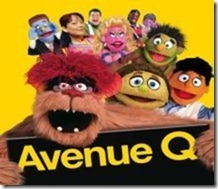 I went out last weekend with my husband, sister and brother-in-law for dinner and to watch the musical "Avenue Q."
I went out last weekend with my husband, sister and brother-in-law for dinner and to watch the musical "Avenue Q."
It was a really funny play—sort of a risqué puppet show. As silly as it was, I noticed that it had an underlying theme to it—the search for one's purpose in life. Actually, this theme wasn't underlying at all—they put "Purpose" up on two big screens in a Sesame-Street-esque video to draw attention to it and poke a little fun at it.
The fact that a musical puppet show could bring up theme in such a huge way made me think about the element in my own books.
Theme isn't something I've thought about or deliberately planned into my books. But genre fiction has themes, too. I write traditional mysteries, so the big picture idea of my books is good vs. evil set in the form of a puzzle.
Not only that, but I do have underlying themes that I seem to come back to over and over and in different series. Did I mean to do this? Actually, no. Apparently, theme can act like the songs that get stuck in our head all day—we just keep repeating them over and over until our brain makes sense of them.
Do our characters have common problems that they encounter or work to address? My protagonists usually live alone (and enjoy it…usually) and encounter intergenerational stresses. They experience the changing roles and role-reversals that come with age. Neither of these things applies to me, but I'm apparently interested in these topics and see a lot of people dealing with them.
Theme doesn't have to be on an epic or literary scale. Have you noticed a certain repetition of ideas or problems in your books? Even small ones? Do your characters have the same types of transformations? If so, this might point to an underlying theme in your books. It really can be just an idea we're exploring…sometimes for more than one book. Heck, sometimes for more than one series.
Theme has an impact on our characters, too, and can make them have more layers. It can affect their view of the world and how they handle different types of conflict. It can provide internal conflict, too. It helps them come alive as they complete a character arc. Because the characters are exploring the themes on the page.
Need help finding your theme or developing one? There was a nice post some time back on the Yingle Yangle blog that featured some helpful questions to ask yourself. Janice Hardy has a nice post on developing theme. And Larry Brooks has a post called Finding – and Leading With — Theme on his StoryFix blog.
As a reader, do you spot theme quickly? Is it something you think about as you write?
*******
And...thanks so much to the folks at Writer's Digest for choosing Mystery Writing is Murder as one of their Top 101 Best Sites for Writers for 2011. :) It's truly an honor.
April 12, 2011
5 Tips for Quickly Writing Your First Draft—by Alan Orloff
Some writers I know bask in the writing process, savoring the time spent crafting a novel as the seconds turn into minutes turn into weeks (and months…and years). For them, writing is a drawn-out love affair.
I'm not one of those people. When I have an idea, I want to get it written as quickly as possible. Why? Because I've got a ton of other ideas, lining up on my brain's tarmac waiting to take flight.
Here are some tips for writing your first drafts (note: first drafts) as quickly as possible.
Give yourself permission to stink. (Put your head out the window and take a deep breath. That odor you smell? I just started a new project.) Don't worry so much about your grammar and sentence construction. Don't try to describe your setting to the finest detail. Dialogue a bit wooden? Don't fret about it now. All these boo-boos can be fixed during the revision process. Why waste time perfecting a certain passage when it might end up on the discard heap?
Don't revise as you go along. Start writing and don't look back. Plow ahead. Odds are, when you finish your draft, there will be tons of stuff (tons!) you'll have to change anyway. Decide to change a character's name? Fine. Highlight the new name and keep on trucking. You can go back and clean things up when you're finished with the draft. Why waste time and effort?
Set a quota and stick to it. Use either the "words-per-day" method or set aside a certain amount of time every day to write. Don't get up from your desk (or bench or bed or hammock or wherever you write) until you've satisfied your quota. It's that easy (insert diabolical laugh here). To get even more done, "fiddle" with your quotas. For instance, you could start out the week with a thousand word daily quota, then increase it by 200 words per day throughout the week. Or you could pick one day a week to "double-dip," where you write twice your daily quota.
Research? You don't need so much stinkin' research! Do only the barest of bare minimums of research. Some writers I know use "doing research" as a procrastination device (I know, can you believe it?). If you come upon something you don't know—a fact, a name, the capital of Justrevoltedstan—just type XXX and keep on writing. You can go back and fill it in during the revision stage. Again, why waste time researching something that might not even make it into the final draft?
Stay away from that durn Internet and other shiny, distracting things. As my blog host Elizabeth recommends, set a timer for checking email and blogs and Facebook and Twitter. Then, when it goes off, your break is over and it's time to get back to…ding!
Hey, gotta run!
**************
 The first book in Alan Orloff's Last Laff Mystery series, KILLER ROUTINE, is now available, at your favorite booksellers and on-line. His debut mystery, DIAMONDS FOR THE DEAD, came out last April and was nominated for the Best First Novel Agatha Award. For more information about Alan and his books, please visit www.alanorloff.com
The first book in Alan Orloff's Last Laff Mystery series, KILLER ROUTINE, is now available, at your favorite booksellers and on-line. His debut mystery, DIAMONDS FOR THE DEAD, came out last April and was nominated for the Best First Novel Agatha Award. For more information about Alan and his books, please visit www.alanorloff.com
******
Thanks for inviting me to your blog today, Elizabeth! I always enjoy my visits here (You have such nice blog readers!)
Thanks for coming by, Alan! Congratulations on your Agatha nomination and your new release!
April 11, 2011
The Kindle as a Revision Tool
 Now that I've brought up a drawback to the Kindle (which I believe will be quickly ironed out in future generations of the product), I thought I'd write a little on one unexpected benefit I've enjoyed with the Kindle…squeezing in extra revision time.
Now that I've brought up a drawback to the Kindle (which I believe will be quickly ironed out in future generations of the product), I thought I'd write a little on one unexpected benefit I've enjoyed with the Kindle…squeezing in extra revision time.
In the past, my revisions have mostly been done at a planned time and place—not spontaneously at all. I write on the go in little unexpected pockets of extra time, but haven't really been able to edit that way.
Instead, I've just taken my laptop and headed off to the library or coffee shop. There are definite drawbacks to revising on paper—one is the transcription process from paper to computer if I get too far ahead. Besides, it's a pain lugging around a 2-inch pile of paper in the off-chance that I can catch a few minutes to edit or revise.
The Kindle does make it easier to edit on the go.
I've just saved my Word docs as text files (.txt) to make things easier. (You can do that when you click 'save as' when you save a file, or you can just copy/paste the document onto NotePad.) You could also save them as PDFs, but the PDFs are like photos on the Kindle—and you can't make the font any bigger (and small type is starting to be a problem for me.)
There are a couple of ways to upload a file to your Kindle (my directions will be for PCs). The free way is to connect your Kindle to your computer using the charger you got with your device (the plug part of the cord comes off and you'll have a USB connection underneath.) Plug one end of the cord into your Kindle, the other into your computer USB port.
When your computer recognizes your Kindle, go to Start/Computer. You'll see "Devices with removable storage." And your Kindle will be there. Click on the Kindle icon and open the documents folder. This is the destination for your manuscript file.
Go to your Documents library and select the file you want. Drag the file to the Kindle (on my computer, I can see the Kindle listed in a column to the left of the Documents library.) Drop it in the Documents folder for the Kindle. Disconnect your Kindle from your PC, hit home on your Kindle device, and you'll see your file.
Or…you could email it to your Kindle. The cost, I believe, is now 15 or 25 cents to do so. Your Kindle has an email address—you can find it on the Manage Your Kindle page when you pull up your Amazon account on your computer. It's a @kindle.com address.
Editing on the Kindle is best for a global read of your manuscript for content problems and less for doing line editing. You can make notes on your Kindle for changes you'd like to make to the document. All the notes that you make on your manuscript can be transferred to your computer. You'll just attach your USB cable again, go to My Computer, find your Kindle device, look in the documents folder, and you'll see a My Clippings folder. Your notes will be in there and you can just copy the file to your computer.
Does it sound complicated? It's actually more intuitive than I've made it sound. It certainly does beat lugging around a huge manuscript with me everywhere. :)
How do you like to do edits and revisions on your manuscript? Do you print them out, do them all on computer, or have you tried using the Kindle?
April 10, 2011
A Kindle Drawback and Possible Implications for Writers
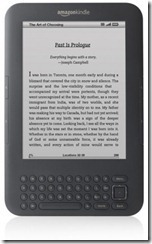 I had coffee with a friend of mine last week. She's also a big reader—now almost exclusively on the Kindle.
I had coffee with a friend of mine last week. She's also a big reader—now almost exclusively on the Kindle.
She's currently reading a novel for our book club. "Let me tell you," she said with a frown, "I'm having a real problem with this book."
I perked up. This is a friend that doesn't even have a problem with obscure Russian literature…so if commercial fiction was stumping her, I was all ears.
"This writer has 7 or 8 different names that start with the letter m. And there are absolutely no textual reminders of the characters' identities. I can't tell who the heck they are or how they relate to each other. And some of the characters have real names and nicknames."
She was pretty agitated about it by now and was waving her arms around and sloshing her coffee.
"And on top of it all, I can't just flip back and figure out who these people are! With a paperback, I'd spend half a minute just flipping back until I got a clue who the character is. With a Kindle, it's just not that easy. I'm getting ready to give up on this book."
What the author was doing wasn't good for any book, of course. Having characters with names that start with the same letter can get confusing…especially that many names. And this was an author published with a major house.
The trouble was compounded by the fact that the writer hadn't put in any of those little tagging reminders of who the character is (especially when they've been offstage for a while.) It's helpful to have a 'Jenny hopped in the car, still wearing her scrubs from work.' Really, you don't even have to be that vague with the reminders: sometimes a 'Jenny, Cameron's sister, got in the car' is fine to slip in.
To make matters worse, there were nicknames for more than one character. And these nicknames weren't like 'sweetie.' No, these were actual names. And the nicknames weren't just truncated parts of the character name (Mike for Michael.) They were totally different.
My friend mulled aloud a few minutes about whether the book would have been salvageable if the story hadn't been on the Kindle. She said that she loved her Kindle, but still missed being able to quickly flip through a book instead of using a "go to" function.
I'm sure that future roll-outs of the Kindle will probably fix this issue—maybe they'll have touch screens or a quick scrolling option.
But in the meantime, it offered another reason to double-check my manuscripts for name problems. Is there anything confusing in there? Would a reader need to flip around in my book to try and figure out who the character is? If so, they're working too hard. This is supposed to be entertainment…better to just fix it.
Especially since flipping pages isn't exactly easy with Kindles.
Are there character naming problems that you run into as a reader or writer? If you have a Kindle, do you miss page flipping?

